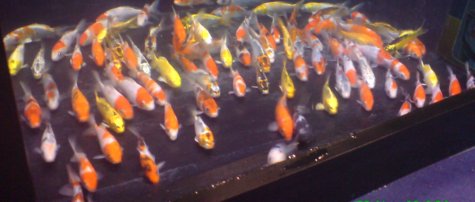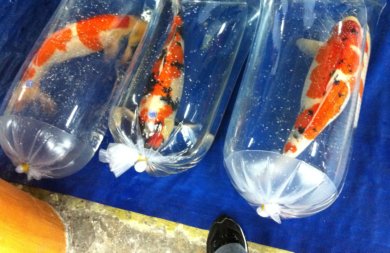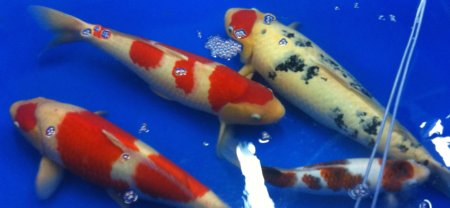|
Koi Fish Facts
Aquarium Fish? Pond Fish? Fish Farming Potential? Having said that, getting to the quality of coloration and patterns required for Koi fish, do involve a lot of removal of the less desired fish. Those removed are culled in some way such as becoming feed fish for predatory fish. Predator? In fact I would say they are probably the most gentle of fishes. Perhaps because they have been cross bred by humans so much and have become really docile as a result. A lot of enthusiasts will feed their beloved Koi by hand even! If ever you have a fish that is being attacked by others, for whatever reason and is in a state of injury, moving the fish to live with your Koi Fish is your best bet to ensure its survival. The Japanese Carp or Koi fish will not harm an injured fish. (This assumes the injured fish isnt very much smaller and that the injured fish isnt a predator itself!) Of course, if you were a Koi fish enthusiast, you may not want to expose your highly prized fish to any kind of potential disease that an injured fish might have, so do be careful. Size? Food Eaten? Aquarium Fish Disease? It is sensitive to water quality. One of the main diseases it will get hit with is dropsy or pop-eye. If you dont check your water quality, do water changes, change your filter media and all that, there is a high chance your Koi will get infected by these conditions. Development of lesions on the body is also a danger with unregulated water quality. Usually, without some good medication, they are as good as dead once they get these ailments. So best thing to do? Take care of the water quality! Tres Tres important! Money Value? As the name implies, the fish that are most prized come from Japan itself where they were first cross bred many years ago from the common carp. Certain farms in Japan are famed for their quality Koi Fish. Its such an art that there are recognized types that are basically distinguished by color patterns of the fish. Not only can the fish itself be valued at thousands of dollars (you read that right), but the fish can be entered into Koi competitions which can reward a heap load of money as well. This is one of the select group of pet fishes in the world, which has reached a stage of being an art as much as a past time, and one that has a focused and distinguished following all over the world. 
Common Fish Names? There are a bewildering variety of names in Japanese for the various color patterns of this fish. Often times, they are simply called by these names such as 'Showa' or 'Kohaku'. Freshwater or Saltwater? Little known fact? 
|





